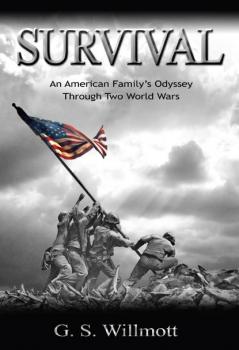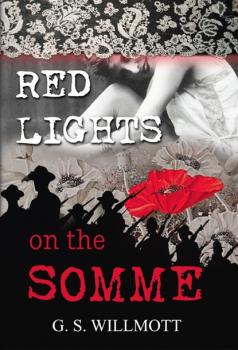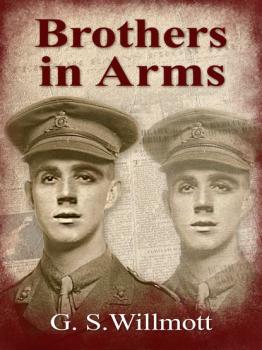Историческая литература
Различные книги в жанре Историческая литератураSurvival
A compelling read, this is the story of one family's journey through wars, tragedies and triumphs. A story of love, family, unity and resilience. Another great story from Australian author G. S. Willmott. Very difficult to put this one down.' – Christine<br /> <br />'Historical thriller of how one family beat the odds to survive WWI and WWII… The ending leaves the reader astonished.' – David<br /> <br />'A masterful book written in the most powerful way, about two families and their struggle with business, two world wars and the loss of the family and friends held dearest to them.<br /> <br />From the very first page you are held in suspense, through the absorbingly vivid descriptions of the most horrific and colourful situations, that were the period during and between the two great wars.<br /> <br />The spellbinding finale leaves the reader wanting answers to the vexed questions of life, and its true meaning.' – Ian
In Rage, Rebellion
In Rage, Rebellion – A volume comprising three feature pieces:<br /> <br />1. Backstage at the Revolution<br />While the African National Congress was a banned organization in South Africa, and the white minority ruled with gunfire, the ANC theatre troupe Amandla toured the world. Amandla is Power. Every performer is a trained soldier and musician, dancer. Here is their tour of Australia.<br />Beginning in darkness, the Overture is unlike any music theatergoers have heard before.<br /> <br />2. Red Ragger.<br />Profile of John Halfpenny, union leader, disgruntled communist, the quarry of every conservative newspaper. Here, he addresses a strike meeting of metalworkers.<br /> <br />3. The Elemental Physick of Wrath.<br />Itself comprised of three pieces on the ignition of anger. Here are encounters with a snake, with mindless violence in an asylum, and with a whale in the Pacific.
Islanders, Far South
Islanders, Far South – Three feature pieces and one column piece in one volume, events in the lives of southern fishing communities in Tasmania.<br /> <br />1.Pride of the Crayfish Fleet.<br />Life in the Bass Strait Islands, out of the Port of Lady Barron.<br /> <br />THE CRAYFISH I HOLD in my hand is forty years old. By whatever system of temporal measurement crayfish use, it is a very old man. In a few weeks its tail will be sliced into the white discs restaurateurs like to call medallions, and moistened with sauces. By then it will be in America.<br /> <br />2.The Oldest Abalone Diver in the Business.<br />The Oldest Abalone Diver in the Business is the man who began the abalone fishery in Australia. To better understand the pattern of natural distribution, he swam from south of Adelaide city to the Wilson's Promontory, a journey of a thousand kilometers.<br /> <br />The weather under the sea changes every few hours. Ebb tide here brings a warm current, hazy with microscopic debris of the shallows, and as fitful as a hot and dusty wind.<br /> <br />3. Digging Holes in the Sea.<br />Working throughout the night at sea, fugitive from un-named troubles in Ireland, Dublin Danny joins the crew, showing skills as a seaman, heavy smoker and chef.<br /> <br />Two of us stand on the rear deck, resting against the wheelhouse, poses much like nonchalance, but we're leaning there because the steel plates are warm from the heating inside.<br /> <br />1. Tasmania, a Lovesong.<br />Families, communities and voyages, beginning in Hobart Town.<br /> <br />SNOW ON THE MOUNTAIN above, and awash with the tides are Waterman's steps, where a pretty Gaff Trader lies forever in state, on show to the modern world, built one hundred and ten years back, so plying these Hobart wharves in 1912, in commission loading lumber, when a Norwegian anchored alongside, this the Fram, an adventurer, leaky and gouged from the ices South, lying back on her chain while a longboat ferried quiet Amundsen for the Dockside, he loosing his greatcoat for the walk to the telegraph, composing the words to be sent to his King.
Let My People Go
For 50 years, until the Berlin Wall fell in 1989, the Soviet Union ran a campaign of repression, imprisonment, political trials and terror against its 3 million Jews. In Australia, political leaders and the Jewish community contributed significantly to the international protest movement which eventually triumphed over Moscow's tyranny and led to the modern Exodus of Soviet Jews to Israel and other countries.<br /> <br />Lipski and Rutland make this largely unknown Australian story come alive with a combination of passion, personal experience and ground-breaking research.<br /> <br />"The struggle for the freedom of Soviet Jewry was one of the most powerful displays of strength and solidarity by the world Jewish community… even those intimately familiar with the struggle will be surprised to discover in Let My People Go how the Australian Jewish community and its leaders were among the campaign's initiators, and how they saw it through to its successful conclusion. This is a unique testament to how a small group can play a big role in history." – Natan Sharansky, Chairman Jewish Agency for Israel, Prisoner of Zion (1977-86)
Robbed of Every Blessing
Ireland, early 1800s. The Napoleonic Wars have ended, leaving an already disjointed country in peril. Maurice O'Dwyer, a young Irishman, considers the lifeless body of an English tithe-collector slain under a rain-filled sky. From that moment it seems his fate is sealed: he and his young simpleton brother, Padraig, are exiled to Australia, <i>An Astráil</i>, to the convict-filled island of Van Diemen's Land – leaving behind his love, his land, and his liberty. However, in the bush Maurice discovers that there are allies in the most unlikely of places.<br /> <br /><b>What the critics said</b><br />"With the passion of an activist and the ear of a poet, John Tully constructs his novel out of the differing perspectives of the colonial project, weaving Irish lives and English lives, black experiences and white experiences into a dense tapestry of oppression and the many little resistances it fostered. This is an account of settlement in all its complexity, a multilayered book written with a deep sympathy for ordinary people coping with the collision of very different worlds. It's a text built from parallels, echoes and resonances, a much-needed excavation of a past that still haunts us." – Jeff Sparrow, co-author of <i>Radical Melbourne: A Secret History</i>
Red Lights on the Somme
In a series of four books based on war, each with a different focus, G.S. Willmott has extensively researched war 'histories' and from them, has created 'his stories'.<br /> <br />This, the fourth and most compelling, recreates a multitude of experiences of the young men caught up in the frenzy and futility of World War 1.<br /> <br />Sex and death, eternal themes, bind together these individual stories; the shared experiences of love and death are the strong bonds which link these young Australian and British soldiers across France, Egypt, Flanders, even Syria. Their suffering is what makes us think deeply about ongoing conflicts which eternally destroy human lives and from which we seem to have learned nothing.<br /> <br />In Red Lights on the Somme, Willmott unearths surprising and positive aspects of war; man's inhumanity to man is counter-pointed by mateship between soldiers, tenderness between lovers, and trust and inter-dependence between humans and animals. The contrast between the nobility and loyaty of non-humans (including dogs, pigeons, horses) forms a stark contrast against the brutality and treachery of mankind.<br /> <br />'This book tells the stories of young men far from home in the battle of their lives, fighting ultimately for their survival. Evocative, gruelling and often brutal the book touches on most aspects of life as an infantryman on the western front and the harshness, sadness and realities of life for those who participated in the first world war. Historically accurate, factual and graphic this well written book is a must read for anyone with an interest in Australians in World War One.' – Christine McLean-McIntyre
Brothers in Arms
This is an extraordinary story, one which provides insights into the dualities of human nature, especially against a background of war. We are confronted with the potential within all of us for both heroism and cowardice, honesty and deception, altruism and greed; there is, in the intensity of war-time, a heightened awareness of moral dilemmas, choices between good and evil which have eternally confronted humankind.<br /> <br />Weaving an intriguing narrative, the author confronts his readers also with the question: where does truth lie? At what point can one depart from contextual history to enter the world of fiction and imagination?<br /> <br />Brothers in Arms provides a rare balance between well-researched historical fact and convincingly imagined events and characters; the plot, with its constant surprises and multiple twists, Is a tour de force and sustains tension and suspense until the final pages.<br /> <br />By creating the personal tragedy of an imagined family within the social, cultural and historical framework of three wars and three continents, Garry Wilmott provides illuminating facts, thought-provoking questions and a constantly engaging read.
Fort Dundas
Fort Dundas was the first outpost of Europeans in Australia's north. It was a British fortification manned by soldiers, marines and convicts, and built by them on remote Melville Island in 1824. It lasted until February, 1829, when it was abandoned and left to the termites.<br /> <br />The fort's purpose was twofold. Firstly, it was a physical demonstration of Britain's claim to the New Holland continent as far as longitude 129E, which excluded the Dutch and the French from starting similar colonies, and it was the first of a series of fortified locations around the coast. Secondly, it was promoted as the start of a British trading post that would become a second Singapore and compete with Batavia.<br /> <br />The settlement was named in a ceremony on 21 October 1824, but it was not a success. In its short existence we have tales of great privation, survival, greed, piracy, slavery, murder, kidnapping, scurvy, and battles with the Indigenous inhabitants of the islands, the Tiwi. It was also the site of the first European wedding and the birth of the first European children in northern Australia.<br /> <br />None of the three military commandants who managed the outpost wanted to be there and all were gratefully relieved after their posting. They left behind thirty-four dead – victims of disease, poor diet and Tiwi spears. Others died when the crews of the fort's supply ships were slaughtered and beheaded by Malay pirates on islands to the north. Two cabin boys from one of them, the Stedcombe, were enslaved by the pirates.<br /> <br />What happened at Fort Dundas and why it was abandoned has been largely untold. Nevertheless, it is one of the most engaging stories of nineteenth century Australia.
Rethinking the Age of Emancipation
Since the end of the nineteenth century, traditional historiography has emphasized the similarities between Italy and Germany as “late nations”, including the parallel roles of “great men” such as Bismarck and Cavour. Rethinking the Age of Emancipation aims at a critical reassessment of the development of these two “late” nations from a new and transnational perspective. Essays by an international and interdisciplinary group of scholars examine the discursive relationships among nationalism, war, and emancipation as well as the ambiguous roles of historical protagonists with competing national, political, and religious loyalties.
Garvey and Garveyism
Amy Jacques Garvey worked closely with her husband, Marcus Garvey, throughout his crusade. Here she gives an insider detailed account of Garvey, Garveyism, and this nascent period of Black Nationalism. Like all great dreamers and planners, Marcus Garvey dreamed and planned ahead of his time and his peoples' ability to understand the significance of his life's work. A set of circumstances, mostly created by the world colonial powers, crushed this dreamer, but not his dreams. Due to the persistence and years of sacrifice of Mrs. Amy Jacques Garvey, widow of Marcus Garvey, a large body of work by and about this great nationalist leader has been preserved and can be made available to a new generation of black people who have the power to turn his dreams into realities.









